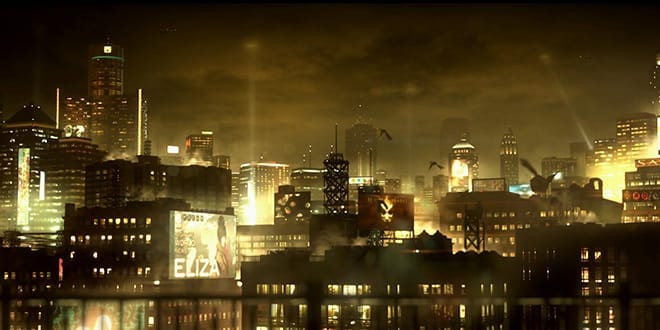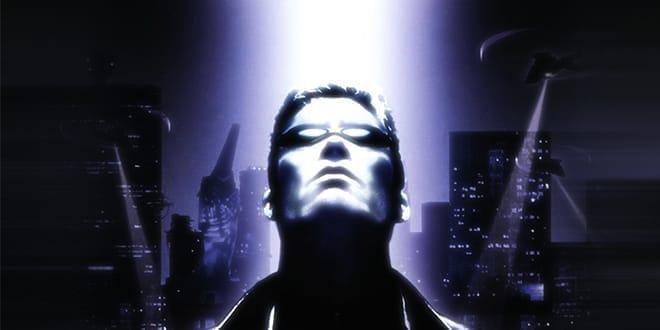I don’t feel like it would be too brash to say that Deus Ex is one of the most influential and groundbreaking games of all time. Fifteen years after its original release on PC, both video game aficionados and fans still talk about the game with incredible esteem. It’s the opinion of this particular journalist that the original Deus Ex is Warren Spector’s magnum opus, and that it is one game that every video game enthusiast should play.
However, on a personal level, I don’t often look at Deus Ex and simply see a series that influenced PC gaming. As someone who is a lover of a great narrative, I see a series willing to tackle deeper themes. As a man who feels games should be developed with all possible playstyles in mind, it shows developers how to truly make an inclusive game from a design standpoint.
Transhumanism is not exactly a word in common parlance, but we may begin to see it mentioned more and more as time goes on. With bionics research making major strides, alongside the breakneck pace that technology moves in, tranhumanism may become a point of debate. As human beings, we often wonder exactly how we can continue to improve our daily lives, and the transhumanist movement suggests that ultimately this will come through technology.
Deus Ex’s world is one where major strides have already been made. It’s a universe where an injured man can have synthetics to improve his way of life, or depending on your point of view, restore it to where it was.
The original Deus Ex was released not long after many debates took place in the public space in regards to science and meddling with humanity. Brought about by the cloning controversy of the late nineties, many people began to ask if there was a line that science should not bring itself to cross. Deus Ex’s series exists in a universe where those questions are still being asked, but it’s not in regards to the hypothetical. Cybernetics and nanotechnology are commonplace (depending on which game in the series you’re playing), and there are narrative elements that do pose the question of how far too far is. To the series’ strength, it lets the player answer these questions on his or her own.

Another underlying theme within Deus Ex has always been its relationship with conspiracy theories. Funny as some of them may be, ultimately Warren Spector and the team at Ion Storm realized that it does make for an interesting world for fiction. Thus, the world of Deus Ex feels oppressive in and of itself. Two of the biggest modern boogeymen are corporate bigwigs and politicians, and the world of Deus Ex is dominated by big government and fat-cat business. In fact, both are simply taken as simply the way things are supposed to be.
While not a unique setting in and of itself (many Cyberpunk stories are similar), Deus Ex’s setting is superior due to the narrative treating its outlandishness with seriousness, thus allowing for much better player immersion. In essence, Deus Ex was an early master of narrative plausibility. Rather than pointing at the setting with a tongue in their cheek and winking, they treat it with a serious face.
From a design standpoint, Deus Ex still stands as one of the bastions of player choice. Similar to Fallout, there are no classes within Deus Ex. Well, unless “awesome guy with sunglasses” is a class. Thus, during the course of the game, your skills are tailored to your play style. This kind of freedom is almost always welcome by the player, but if the world around you doesn’t allow for any type of play style to conclude in victory, it’s ultimately a hollow gesture. In Deus Ex, if you don’t want to kill a single soul, nothing is forcing you to. If you want to become Nanobot Rambo, that option is open to you.
You see, Deus Ex teaches developers everywhere a very important lesson. Player freedom is ultimately decided by the mechanics and the level design. If they aren’t in tandem with one another, the game is less of an experience for it. The fact that the game’s design is still referenced in this regard after fifteen years speaks for its staying power. When the player feels in control of their character, they’re immersed.
So, what is the legacy of Deus Ex? From my perspective, the series stands as definitive cyberpunk when it comes to its genre as fiction and definitive role playing in regards to video games. Fifteen years later, Deus Ex is still very relevant. With the upcoming Mankind Divided continuing the series, the expectations will continually be set high for the developers. When you’re one of the best, you’re expected to be the best, and many gamers out there hope that the series will continue to match the legacy of its predecessors. Even if things were to go sour for the current development team, Deus Ex has solidified its legacy, and one would even argue its immortality.
Have a tip, or want to point out something we missed? Leave a Comment or e-mail us at tips@techraptor.net













